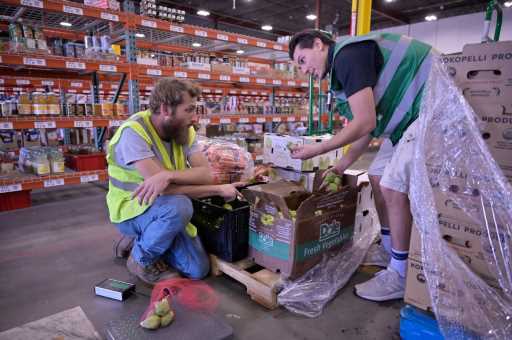Denver-based online grocer Pinemelon strives to offer local products
The atmosphere was laid back on a recent afternoon at the warehouse of Pinemelon, a startup grocery service, as a few people talked and walked among the long metal shelves of boxes, bags and jars of food. It was the calm after the storm.
“We have capped out for the day. We don’t have the capacity to do any more deliveries today,” said Sarah Young, the company’s marketing director.
For about a week, Pinemelon’s promotion was a dozen Palisade peaches for a penny, making about 90-plus deliveries a day.
“We’re working through staffing and figuring out how we can kind of take this and grow and continue to expand our operations,” Young said.
Pinemelon operates out of a 30,000-square-foot warehouse on the north side of Denver. The online grocery service, which started in April, emphasizes quality and a “local first” approach, said John Gengel, the general manager.
Pinemelon is working every day to build relationships with vendors, ranchers and farmers on the Western Slope and along the Front Range to expand its line of Colorado products, Gengel said.
Pinemelon sells produce from orchards and farms in western Colorado as well as small operations in the Denver area. One of its suppliers for meat is the Buckner Family Ranch near Longmont. The website notes which products are local.
“We are about 80% natural and organic and 20% of our assortments are pantry staples, conventional products that people know and love,” Gengel said.
Pinemelon’s delivery area is within a roughly 30-minute radius of its warehouse, taking in a big chunk of the metro area.
“We do guarantee same-day delivery and we want to make sure we can make good on that promise,” Gengel said. “There’s a certain customer aspect to it as well. If something does go wrong with an order we’re able to make it right the same day because we can get back out and replace the product or refund, if they prefer.”
While Pinemelon is a new company, several of the more than 50 employees have significant experience in the industry.
“We have a team of people at all levels who’ve been in the grocery industry for decades. Their combined experience is probably well over 150 years,” Gengel said.
They have established relationships with local producers, he added.
“And many of these people are very small producers. It’s hard for them to ramp up production to get into a larger retailer, who may be super interested in pushing locals but they might have minimums and contracts and all of these barriers,” Gengel said. “We’re very nimble so we’re able to work with some super-small suppliers.”
Connor Herrick worked for Whole Foods for 16 years before joining Pinemelon as head of the produce team. He said he can move more quickly and make decisions faster in his new job.
“I also think it’s cool to be part of a startup. A lot of the industry is going more toward delivery so I really wanted to be on the cutting edge of that,” Herrick said.
What’s a pinemelon?
Pinemelon’s roots extend all the way to Kazakhstan. Gengel said Alexey Lee started a similar company there and wanted to expand into the U.S. He chose Denver as a launch site based on the size of the city, population density and income and education levels.
Expanding into Denver happened around the time that people started using online shopping and delivery services more because of the coronavirus pandemic. Gengel said he was working in “brick and mortar” at the time and the business had to develop a more robust system to deal with all the orders for delivery or curbside pickup.
Young said customers with families like the convenience of getting their groceries delivered. The business model is a natural for many customers, especially the millennial generation for whom “everything has kind of been digital,” she added.
“I think the most interesting kind of new customer sets are the (baby) boomers. It came to be a necessity in the pandemic,” Young said.
Those customers are now one of the company’s highest-grossing target audiences, she said.
Since Pinemelon’s vans began rolling, the company has increased the number of the different types of items it sells from about 3,500 to around 6,300. The number of vendors has grown from 106 to more than 150. Employees have fulfilled roughly 6,000 orders from approximately 1,800 unique customers.
Gengel said the original goal was to increase the different types of products for sale by 1,000 a month.
“We quickly realized that was not the best strategy and the smartest way for us to grow,” Gengel said. “It takes a lot of time when you’re developing relationships with small vendors and farmers. We didn’t want to move quickly just to hit a number.”
With Colorado’s produce season at its peak, Pinemelon’s assortment is about 40% local, Young said. The company’s overall offerings are about 20% local.
So, does Pinemelon sell pinemelons? And what is a pinemelon? The company doesn’t sell pinemelons, also known as citron melons. The fruit is a distant relative of the watermelon and is native to Africa, although it grows wild in parts of the U.S., according to PlantSnap, a plant-identifying app. Whether pinemelons are actually edible appears to be open to debate.
“Our sister company is called Arbuz, which means watermelon in Russian, the most widely spoken language in Kazakhstan,” Young said. “The running joke is the URL was available.”
Grown in Lakewood
Tasty Acres in Lakewood is one of the local businesses that Herrick, head of the produce team, has signed up for Pinemelon. The farm bills itself as “almost an acre” and grows various varieties of lettuce and “baby root vegetables,” small varieties or ones that are harvested when they’re young and small.
Christin Mihon and her husband, Sean McCracken, started the business in 2017. They didn’t have farming backgrounds, but were hobby gardeners and wanted to build something together.
“We sell everything we grow wholesale to other businesses,” Mihon said. “We’re selling to restaurants, we’re selling to distributors. We sell to other farmers that are looking to expand their (community-supported agriculture) offerings.”
The COVID-19 restrictions that took a toll on restaurants hit Tasty Acres hard, Mihon said. “But we were able to hold on and this will be our best year so far,” she said.
Pinemelon contacted Tasty Acres and asked what kind of working relationship the farm would want.
“This year, our discussion with Pinemelon was we can just offer you what we have available week to week. If the relationship goes well this year, next year we can build what you guys want into our crop plan,” Mihon said.
The farm is geared to wholesale transactions and doesn’t package its products for retail sales. Pinemelon said it would buy the produce by the pound and package it for individual customers.
“In that way they definitely met us where we are,” Mihon said. “It’s great for us because it expands our ability to sell to consumers.”
Source: Read Full Article





